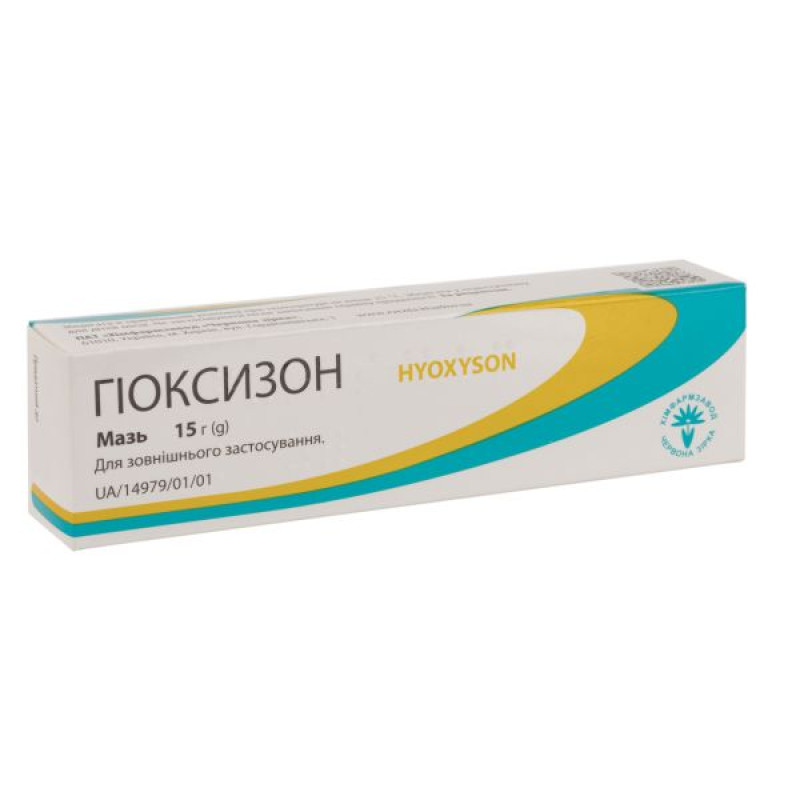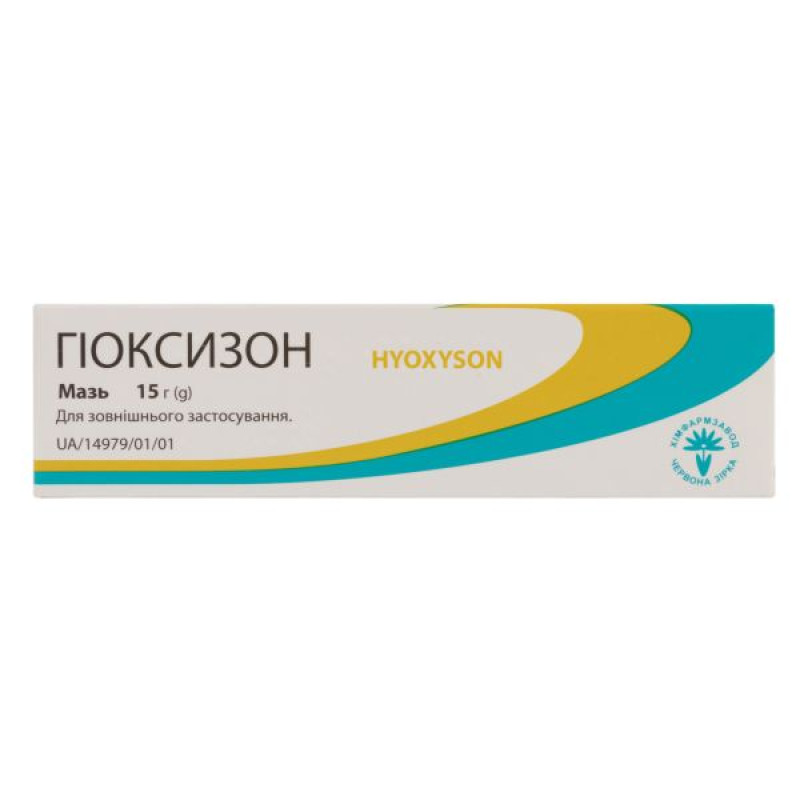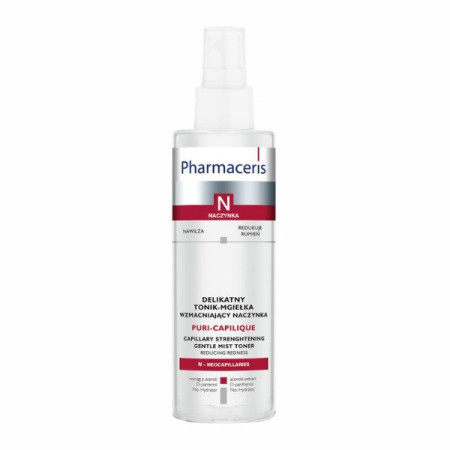Hyoxysone ointment tube 15 g

Instructions Hyoxysone ointment tube 15 g
Composition
active ingredients: hydrocortisone, oxytetracycline;
1 g of ointment contains: hydrocortisone acetate 10 mg, oxytetracycline hydrochloride 30 mg;
excipients: methyl parahydroxybenzoate (E 218), mineral oil, yellow soft paraffin.
Dosage form
Ointment.
Main physicochemical properties: yellow ointment.
Pharmacotherapeutic group
Low-potency corticosteroids in combination with antibiotics. Hydrocortisone and antibiotics.
ATX code D07C A01.
Pharmacological properties
Pharmacodynamics
The drug Hyoxysone has a combined effect.
Oxytetracycline is an antibiotic of the tetracycline group, the mechanism of action of which is to inhibit the protein synthesis of microorganisms. The drug has a bacteriostatic effect on both gram-positive and gram-negative bacteria.
Hydrocortisone acetate belongs to the group of corticosteroids with moderate local anti-inflammatory, antipruritic and vasoconstrictor effects.
Pharmacokinetics
Oxytetracycline, when applied topically, penetrates the systemic bloodstream in small amounts.
Hydrocortisone acetate, when applied topically, especially to small areas of skin, is absorbed through the skin, metabolized to hydrocortisone and other metabolites directly in the epidermis, and only a small portion is then absorbed in the liver.
Metabolites and a small portion of unchanged hydrocortisone acetate are excreted in the urine or bile.
Indication
Treatment of dermatoses complicated by infection (dry forms and scaly areas); primary allergic dermatoses, various forms of eczema, prurigo, contact and seborrheic dermatitis, chronic psoriasis.
Contraindication
Skin lesions caused by bacterial infections (e.g. pyoderma, syphilitic lesions), viral infections (e.g. herpes zoster, common warts, flat warts, condyloma acuminatum, molluscum contagiosum); infections caused by fungi and yeasts; parasitic infections (e.g. scabies); ulcerative skin lesions; ichthyosis, juvenile plantar dermatosis, acne vulgaris, rosacea, fragility of skin vessels, skin atrophy; skin neoplasms.
Allergy to corticosteroids, oxytetracycline hydrochloride or other components of the drug. Not recommended for use in common and rosacea acne, perioral dermatitis (dermatitis perioralis), after prophylactic vaccinations. Do not use on wounds, precancerous conditions of the skin and skin cancer. Contraindicated in bacterial infections (including tuberculosis), viral infections (including herpes, chickenpox).
Interaction with other medicinal products and other types of interactions
When used topically as directed at recommended doses, no interactions have been identified.
It is not recommended to use two or more topical medications simultaneously due to possible changes in the concentration of active ingredients at the site of application or skin redness.
During treatment with the ointment, it is not recommended to get vaccinated against smallpox or other types of immunization.
Application features
Treatment should be discontinued if symptoms of skin irritation appear.
If no improvement is observed after 7 days of use of the drug, treatment should be discontinued due to the fact that hydrocortisone may mask the symptoms of a developing infection.
Do not use continuously for more than 2 weeks. Prolonged use may lead to the development of bacterial resistance to oxytetracycline hydrochloride and mitotic superinfection.
Contact of the drug with eyes, mucous membranes and wounds should be prevented.
Do not use around the eyes due to the risk of glaucoma or cataracts.
The skin of the face and scalp, as well as the genitals, is particularly sensitive to the occurrence of adverse reactions. In case of inappropriate use, as well as in the presence of bacterial, parasitic, fungal or viral infections, the manifestations of these diseases may be masked and/or aggravated. Apply to the skin of the face, as well as in the groin area only in case of urgent need, since increased absorption and a high risk of side effects (telangiectasia, perioral dermatitis) are possible even after short-term use. The drug should be used with caution in the presence of atrophy of the subcutaneous tissue, especially in the elderly.
Due to the fact that corticosteroids can penetrate the skin, prolonged use and use on large areas of skin should be avoided. The drug should not be used under an occlusive dressing due to possible epidermal atrophy, skin stretching and superinfection. Corticosteroids are associated with systemic side effects, hypothalamic-pituitary-adrenal dysfunction, including hyperglycemia in Cushing's syndrome, glucosuria.
Due to the content of corticosteroids, the drug should be used with caution in patients with psoriasis.
The preparation contains methyl parahydroxybenzoate (E 218), which may cause allergic reactions (possibly delayed).
Ability to influence reaction speed when driving vehicles or other mechanisms
The drug does not limit mental and motor abilities, as well as the ability to drive vehicles and work with other mechanisms.
Use during pregnancy or breastfeeding
The drug is contraindicated during pregnancy and breastfeeding.
Method of administration and doses
The drug is intended for topical use. Apply a thin layer of ointment to dry affected skin and flaking areas 2–3 times a day. Do not apply the ointment under an occlusive dressing. Treatment is usually carried out for 1–2 weeks. Do not apply to the skin of the face for more than 1 week. It is recommended to use no more than 10 g of ointment per week.
Children
The drug should not be used in children.
Overdose
With prolonged use on large areas of skin, in large doses, when used under an occlusive dressing, symptoms of overdose may appear, manifested by an increase in systemic side effects characteristic of corticosteroids (hyperglycemia, glucosuria, Cushing's syndrome) or oxytetracycline. In case of overdose, the drug should be gradually discontinued.
Adverse reactions
Skin and subcutaneous tissue disorders:
local skin irritation, rash, burning sensation, itching, sweating, dry skin; hypertrichosis, skin discoloration or depigmentation; contact dermatitis, eczema, delayed wound healing, redness, striae, steroid purpura, skin discoloration, skin maceration, acneiform lesions; perioral dermatitis, with or without skin atrophy, epidermal growth inhibition, subcutaneous tissue atrophy; inflammation of hair follicles, development of secondary bacterial or fungal infections; “ricochet effect”, which may lead to steroid dependence; telangiectasia.
On the part of the endocrine system: adrenocortical suppression, hyperglycemia, glycosuria.
Systemic disorders are observed due to the absorption of hydrocortisone acetate into the systemic bloodstream and cause:
Cushing's syndrome, intracranial hypertension; angioedema; increased resistance of bacterial strains; blastomycosis.
On the part of the organs of vision: increased intraocular pressure and the risk of cataracts (with systematic contact of the drug with the conjunctiva).
Immune system disorders: allergic reactions, hypersensitivity reactions including angioedema, photosensitivity
Expiration date
3 years.
Storage conditions
Store in the original packaging at a temperature not exceeding 25 °C.
Keep out of reach of children.
Packaging
15 g of ointment in tube No. 1 in a cardboard pack.
Vacation category
According to the recipe.
Producer
PJSC "Chempharmaceutical Plant "Chervona Zirka".
Location of the manufacturer and its business address
61010, Ukraine, Kharkiv, 1 Hordienkivska St.
There are no reviews for this product.
There are no reviews for this product, be the first to leave your review.
No questions about this product, be the first and ask your question.


















